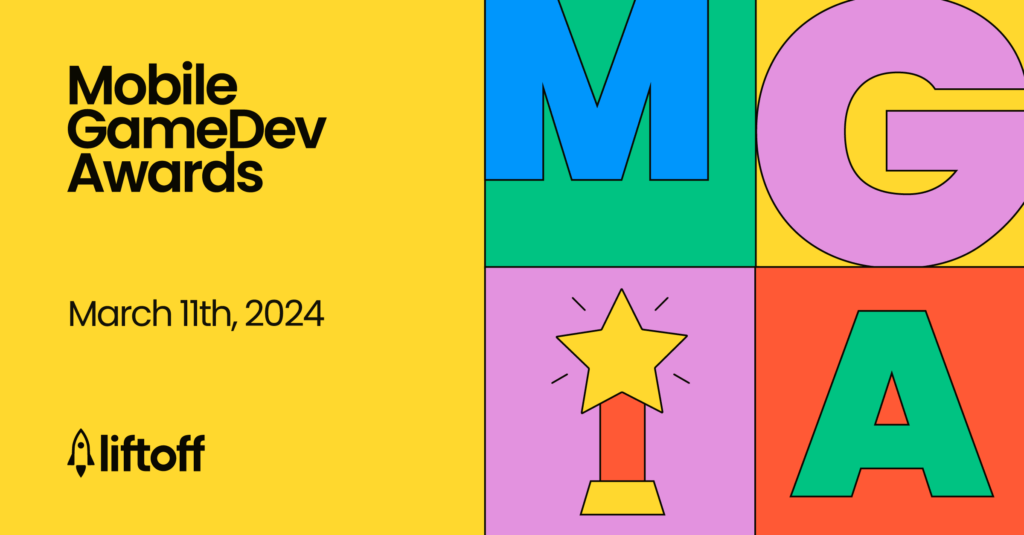Following the high-level trend of hybridization across mobile, more and more casual games have started introducing competitive elements into their live event strategies. If executed correctly, introducing new mechanics in this way can be an easy win, enabling developers to test out player preferences, broaden motivational appeal, boost user acquisition, and enhance player engagement – all without drastically altering the core gameplay.
This has become especially prevalent in the puzzle subgenre, with around 75% of casual puzzle games in the US top-grossing 200 implementing these features. In terms of what this looks like in practice, competitive events in casual puzzle games (as well as the casual genre as a whole) can be roughly broken down into four different archetypes:
- Solo tournaments
- Co-op tournaments
- Race events
- 1v1 competitions
1v1 competitive events, as the name suggests, are events where players go head-to-head against another lone player in a thrilling battle of brains and speed. What’s particularly interesting about this archetype is its rarity. Only 15% of casual puzzle games in the US top grossing 200 have implemented it, despite it proving reasonably effective at boosting performance in several level-based puzzle games.
With that in mind, are mobile game studios missing out on an important opportunity here to boost engagement? Join us below as we analyze some of the most interesting implementations of 1v1 competitive events in top-performing casual puzzle games.
The basic format of 1v1 competitive events
At their most basic level, 1v1 competitive events in casual puzzle games see players competing against a random online opponent over a set time limit to win rewards. These events are typically based on each title’s existing primary gameplay loop, often using similar levels to those users might have encountered when playing alone. These competitive events also don’t tend to require any special currency or paid elements to enter.
These 1v1 competitive events are mainly aimed at players who fit into what we describe as the ‘King of the Hill’ archetype:
“Kings of the Hill prefer games with a high degree of competition with other players. For this player type, PvP-action is the best (and often the only) way to get the most satisfaction out of gaming. Kings of the Hill enjoy the sense of power resulting from competing against friends, acquaintances, or random people and then outwitting, outmaneuvering, and outlasting them.”
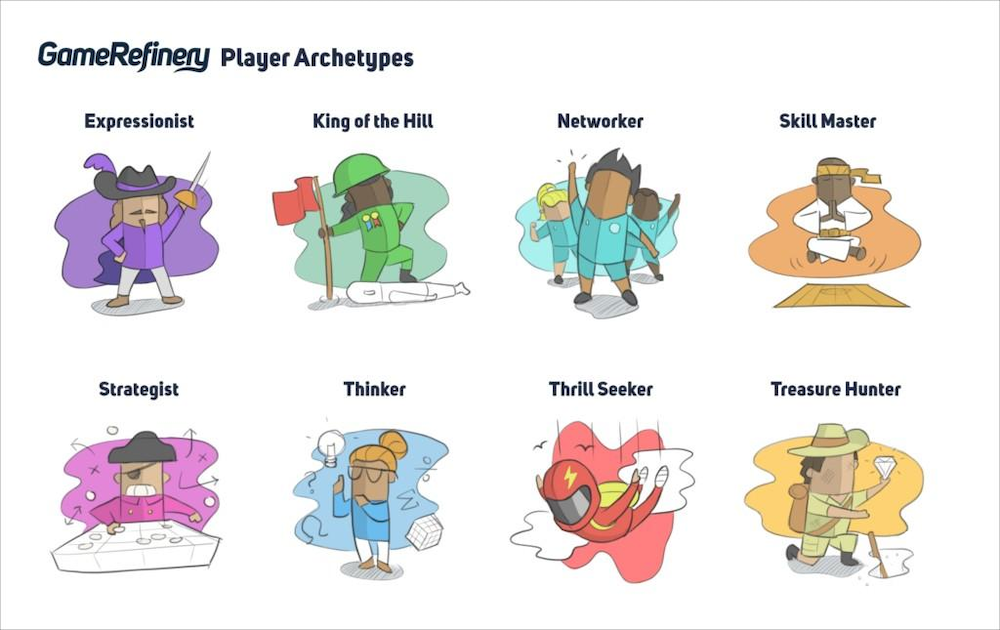
Mobile game developer Playrix is one of the pioneers of this event type in casual puzzle games, spicing up their LiveOps rotation with fast-paced, competitive events.
For example, the Instant Showdown recurring event brings light PvP action to Homescapes. The event, which usually runs on weekends, matches players against an opponent in a head-to-head competition that lasts for six hours. Players aren’t expected to be glued to their phone screen for all that time. Instead, they must simply complete regular levels during that window using as many bombs (a type of in-game booster) as they possibly can — these can be acquired through IAP or by combining five identical puzzle pieces during a level.
Suppose a player manages to use more of these prolific ‘bombs’ during that period than their opponent. In that case, they win the competition and receive a reward – usually a nice set of boosters. Once a round ends, players can start a new showdown with a different opponent to keep earning rewards.
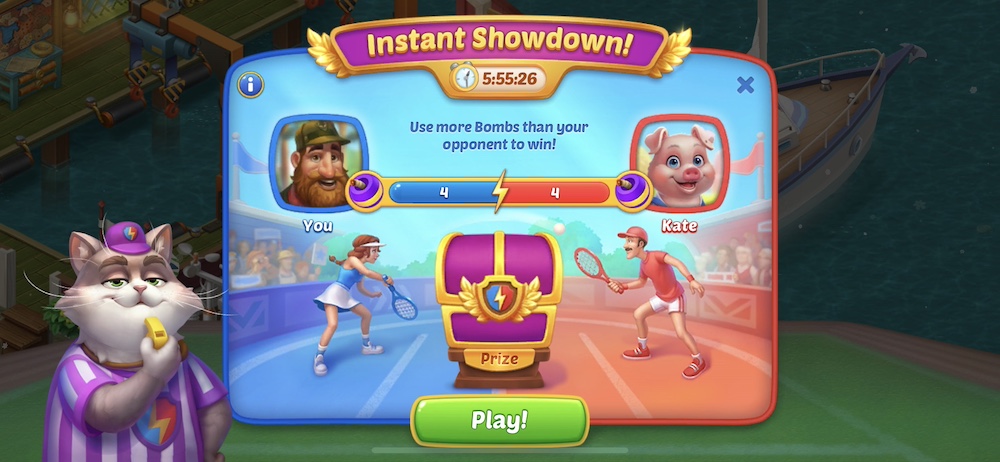
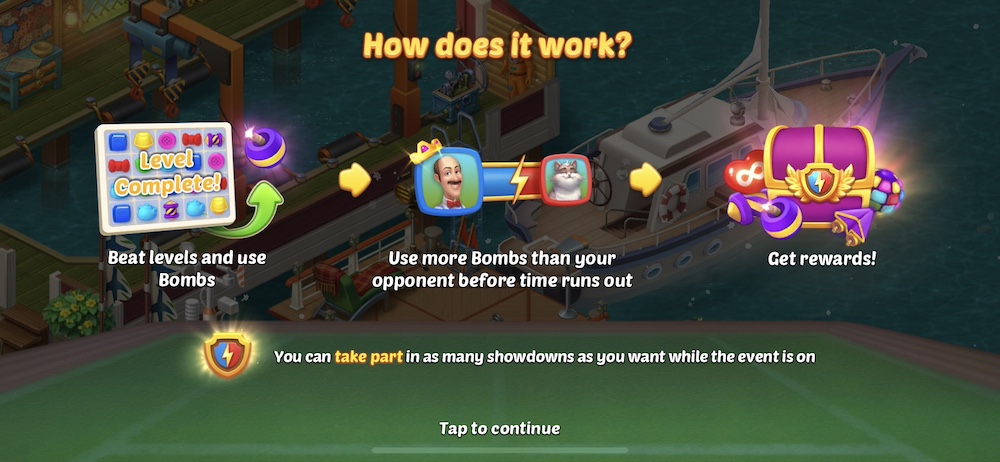
Fishdom is another Playrix game with a 1v1 competitive event incorporated into its Live Event- framework. Like Instant Showdown, the Underwater Polo event sees players go head-to-head to see who can activate the most bomb boosters across normal levels over an hour. Whoever emerges victorious wins a random assortment of boosters.
Recently, Fishdom replaced Underwater Polo with another 1v1 Competitive event called Lighting Duel, which has similar mechanics but slightly changes the scoring rule. Instead of activating bombs, players gather event points by removing puzzle pieces in Match3 levels with the usual Lighting boosters. This adds a fun twist to the scoring as a Lighting booster can remove any one color of puzzle pieces or the whole playing field if combined with another, meaning that the points players get depend on how they use the booster.
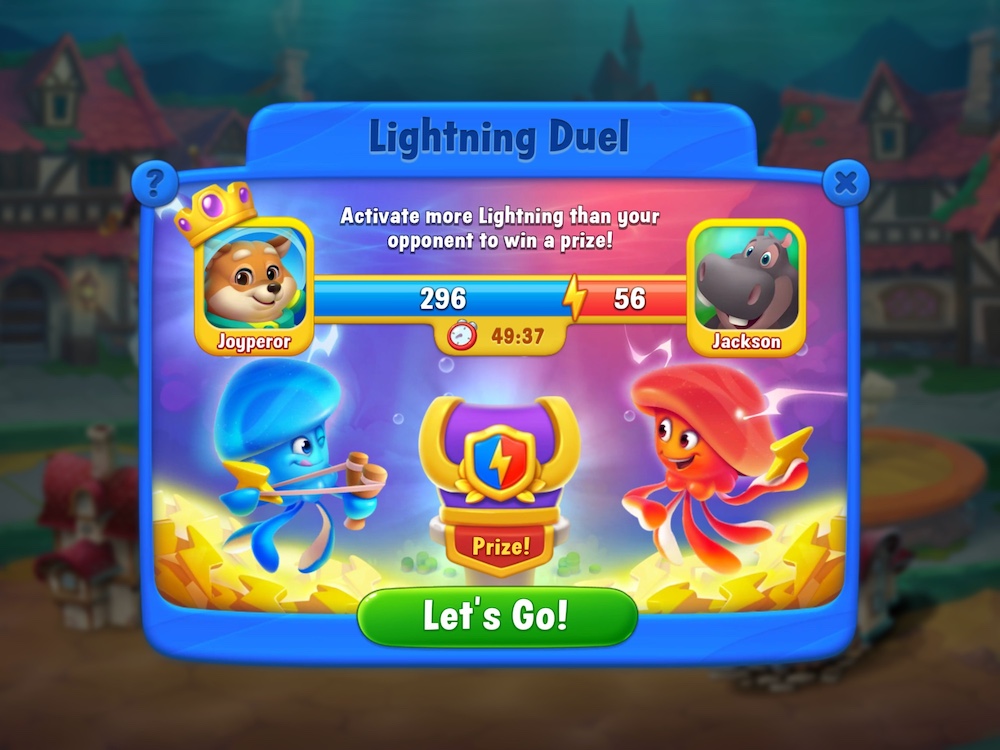
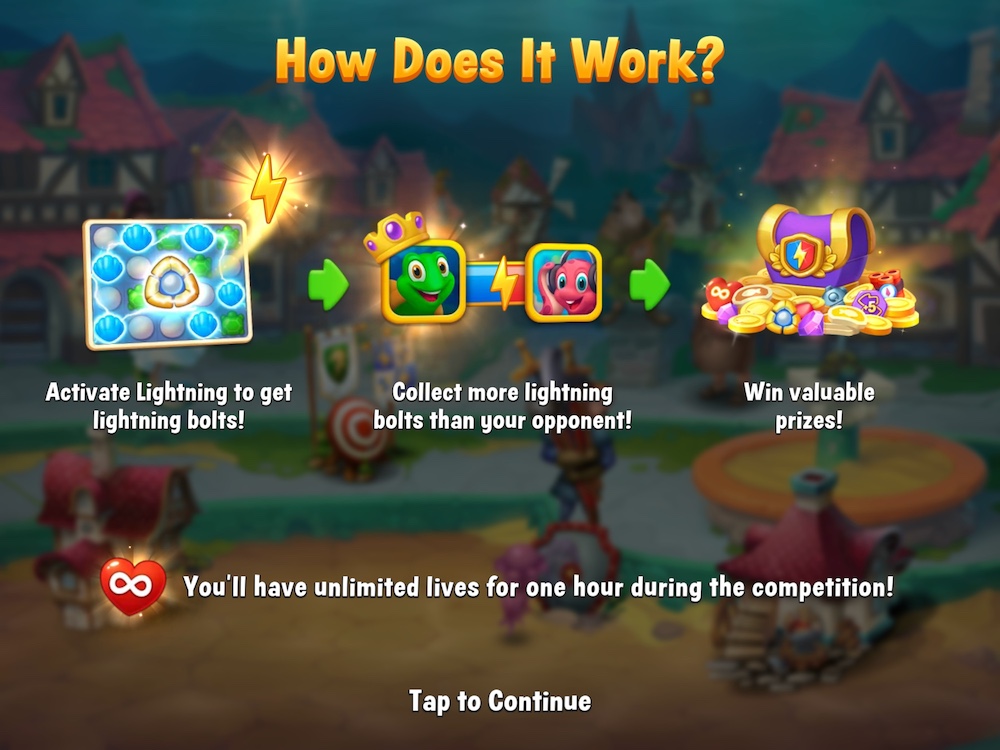
The most innovative 1v1 competitive events across the casual puzzle genre: progressive reward systems and incentivizing win streaks
As more casual games have begun to implement this event type into their Live Events- framework, variations in rules and mechanics have kept things fresh and unique between each title. We’ve pulled together some innovative examples of 1v1 competitive events to show you what we mean.
Star Blast and Toy Blast
Peak Games is a big fan of 1v1 competitive events and has been introducing them into titles across its portfolio to varying degrees of complexity.
On the simpler end is Lightning Duel, a 1v1 competitive event implemented into the soft-launch match3 game, Star Blast, which follows the basic format outlined above. A more unusual example is the 1v1 competitive event Puzzle Duel in their other casual puzzler, Toy Blast. While this match3 title also follows the same basic format, pitting two players against each other who race to use the most boosters over a set period, it twists the formula by incorporating a simple progression reward system.
When a player wins a game, they are presented with a reward chest full of boosters and the option to move onto a ‘second stage’ against another opponent where they will fight for an even better prize. Should they also win that match, the player can enter a final stage for the top prize, after which the cycle will start over. The losers, meanwhile, are invited to stay on to compete for the same level chest once again against a new opponent.
Interestingly, the first match in each round of Puzzle Duel is free, but all subsequent matches require players to pay a small amount of soft currency to participate. While this small paywall might seem insignificant, it has a surprisingly strong impact on player behavior. For example, as users only have one free try each round, they’re more likely to give it their all and use up their boosters (meaning they’ll have to purchase more later on).
Similarly, those players who do opt to part with their soft currency to keep playing will use up their savings, drawing them ever close to that choice between spending or failing.
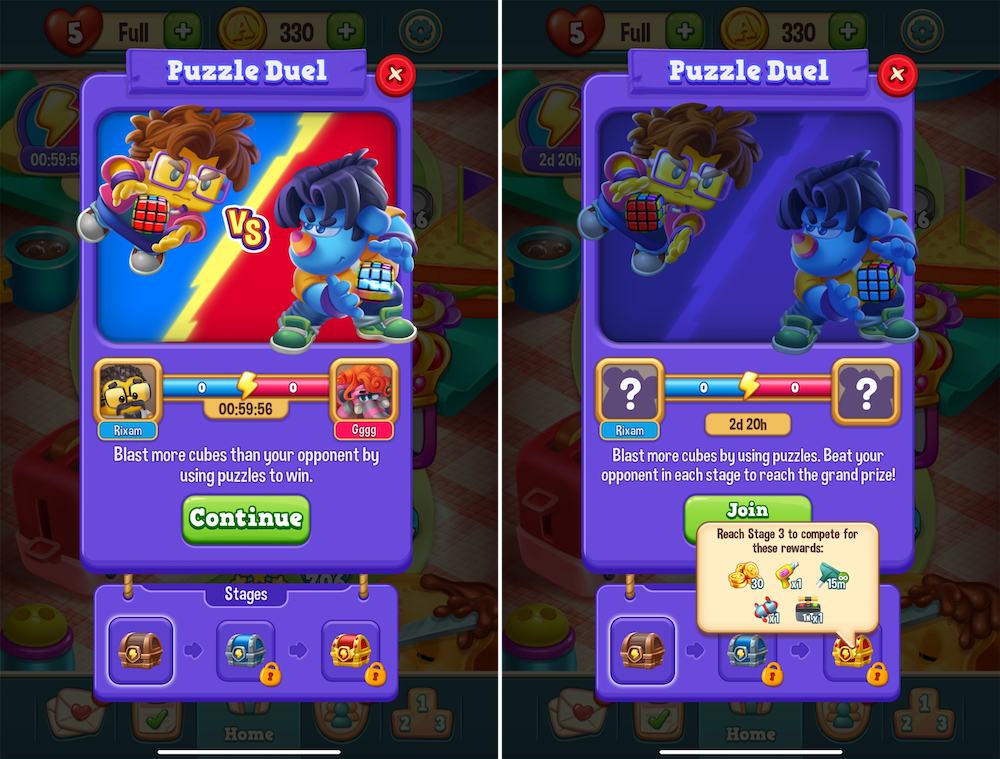
Matchington Mansion
Developer Magic Tavern has taken this idea a step further in Matchington Mansion with its 1v1 competitive event, Bake-Off. Rather than having just three cumulative stages, Bake-Off has a full-blown reward path with clear thresholds players must reach to unlock various items. They advance through the reward track each time they win a match. Should they lose, players are not penalized and are simply matched with another opponent.
Those dedicated enough to reach the end of the reward path are rewarded with a special badge of recognition, which will be displayed on their profile during the event, alongside a chest with even more rewards.
Each iteration of this recurring event lasts for around three to four days, which is significantly longer than the previously mentioned examples; this is to give players sufficient time to advance on the reward path and encourage longer-term engagement. However, each individual 1v1 competition only lasts for 30 minutes, retaining that sense of urgency.
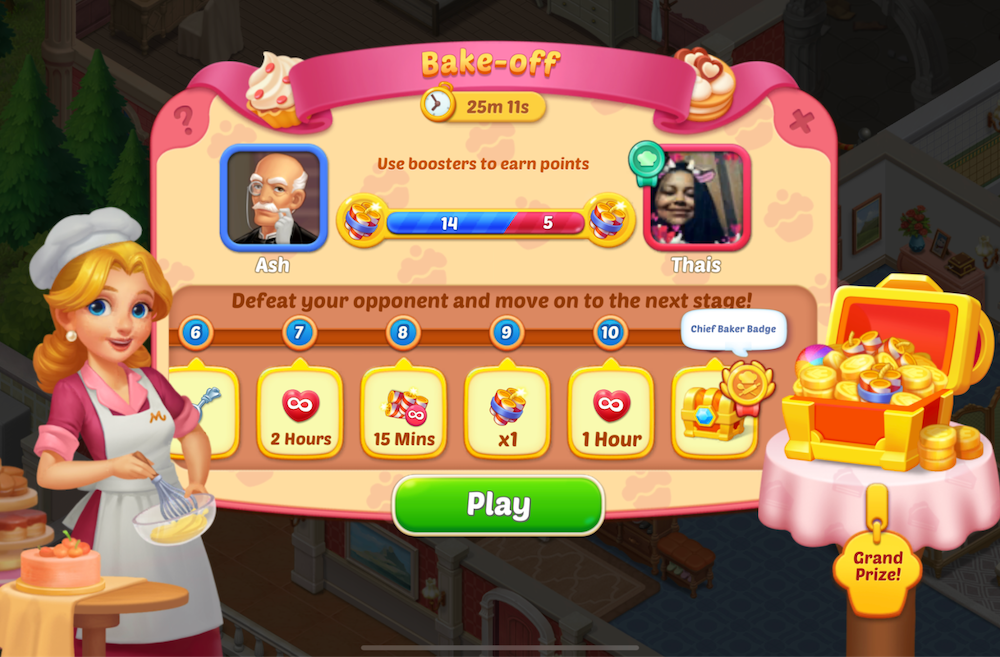
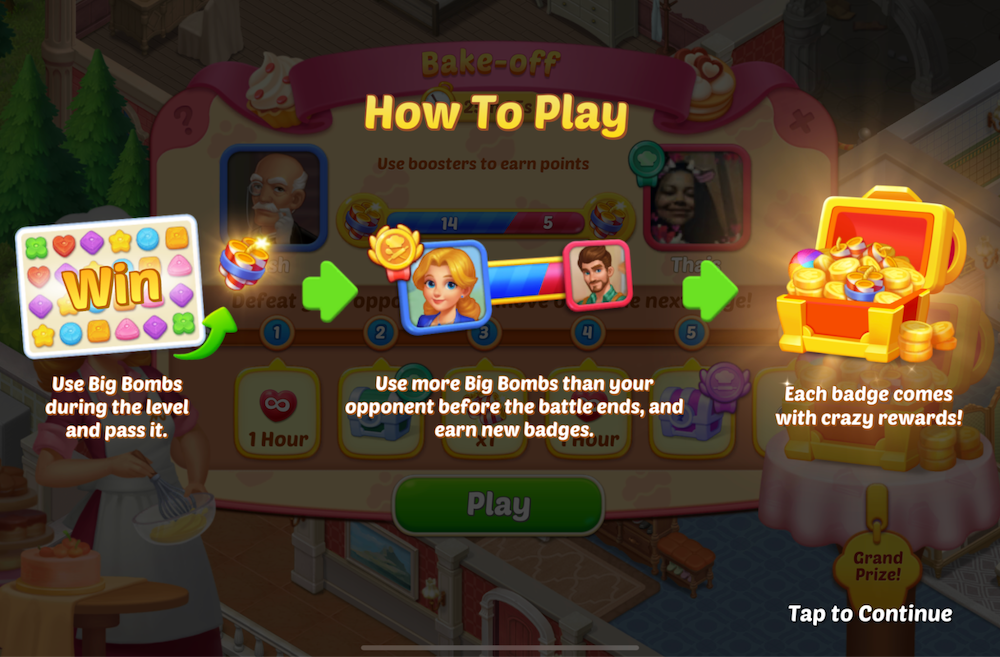
Property Brothers
An even more dynamic reward system can be found in Property Brothers’ Designer Vs. Designer event. Here, players are matched with random opponents each day, who they compete with to see who is the best property renovator. Players are given an individual versus room to renovate in each match based on set requirements and are awarded points based on how well they can follow those requirements. Whoever racks up the highest score wins.
Like Matchington Mansion, the event utilizes a progression meter with a threshold reward mechanic and requires a soft currency earned in the main game to participate (in this case, Stars, which are earned by completing normal levels). Progression points are calculated based on the results of renovations: winners get three points, while losers drop a point. The rewards up for grabs are mainly soft and premium currency.
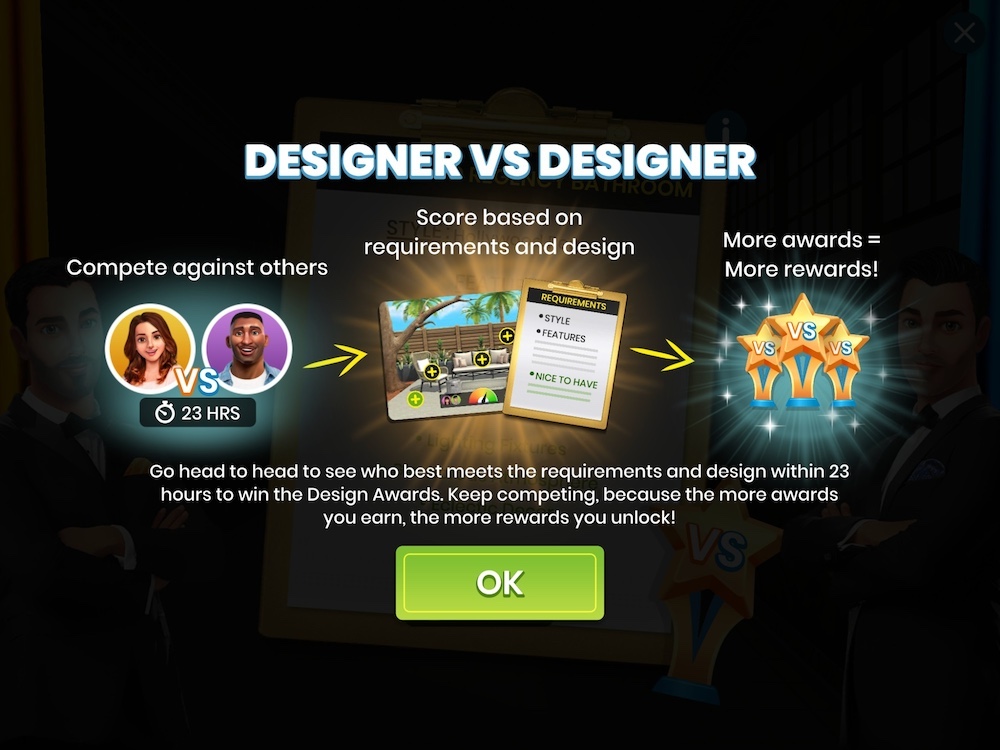
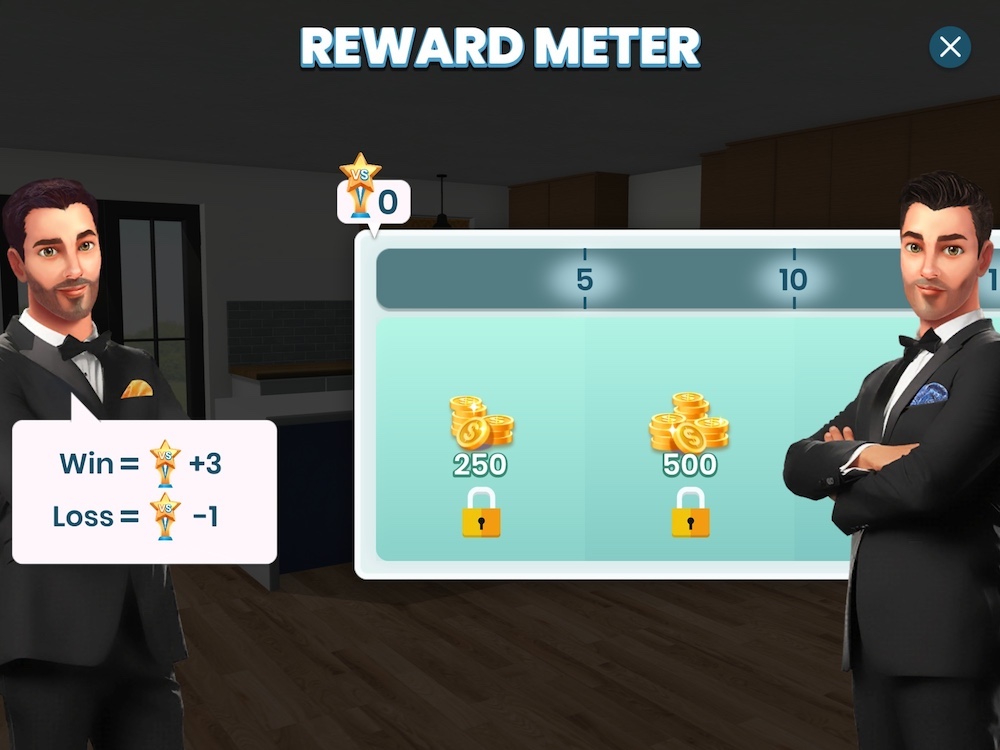
Tile Busters
The Knight’s Challenge event in the mahjong solitaire style puzzler Tile Busters encourages players to maintain a winning streak to earn event points faster. Players earn the most event points when they win a level on their first try and fewer points on the second and third attempts to beat a level. This subtly helps to drive revenue, as players have the option to buy powerful boosters to increase their chances of success or purchase a continue to avoid losing a level.
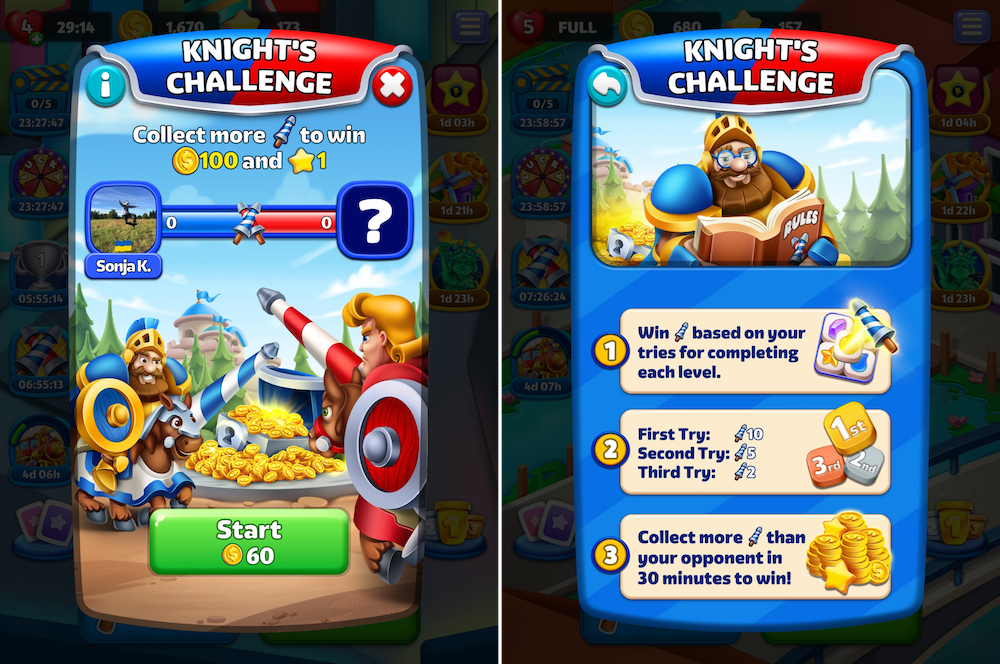
What is more, Tile Busters has taken a step further in bringing extra competitive elements by introducing the Instant Duel event, making a proper 1v1 synchronous PvP mode with separate gameplay. In the event, players spend soft currency to enter a match against a random opponent, playing the same board synchronously and competing on who clears the board faster. The winner gets soft currency and earns ranking points to climb up the leaderboard, whereas the loser loses their entry fee and -1 ranking point. Moreover, there is a laddered win streak multiplier for the ranking points that players earn from their consecutive wins, and players can pay soft currency to keep it after losing. A higher ranking on the leaderboard gives better reward chests.
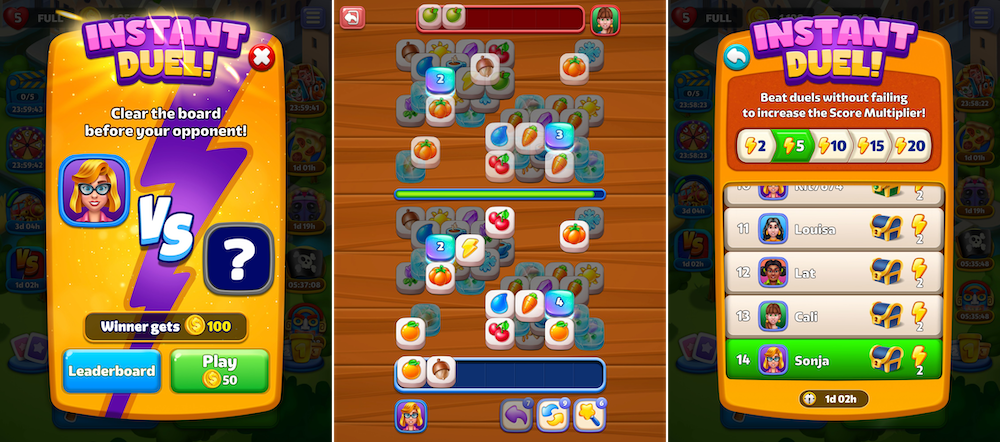
Competitive events in other mobile genres
We’ve spent a lot of time focusing on 1v1 competitive events in casual puzzle games, but that’s far from the whole story. These events have been featured in some other casual games from different genres, complimenting the core gameplay and expanding the event rotation.
Coin Master’s Coinpetition and Arena of Warriors events
One interesting example is the casual casino title Coin Master, which has taken the template of other 1v1 events and enhanced it with race mechanics.
Take the aptly titled Coinpetiton event as an example. Initially, this looks very similar to most of the other events we’ve mentioned; players get paired against a random player in a 30-minute competition and race to see who can gather coins (soft currency) the fastest. However, there is one key difference. In Coin Master, players can actually win before the time limit is up by reaching a set threshold, turning the competition into an exciting sprint for the finish line.
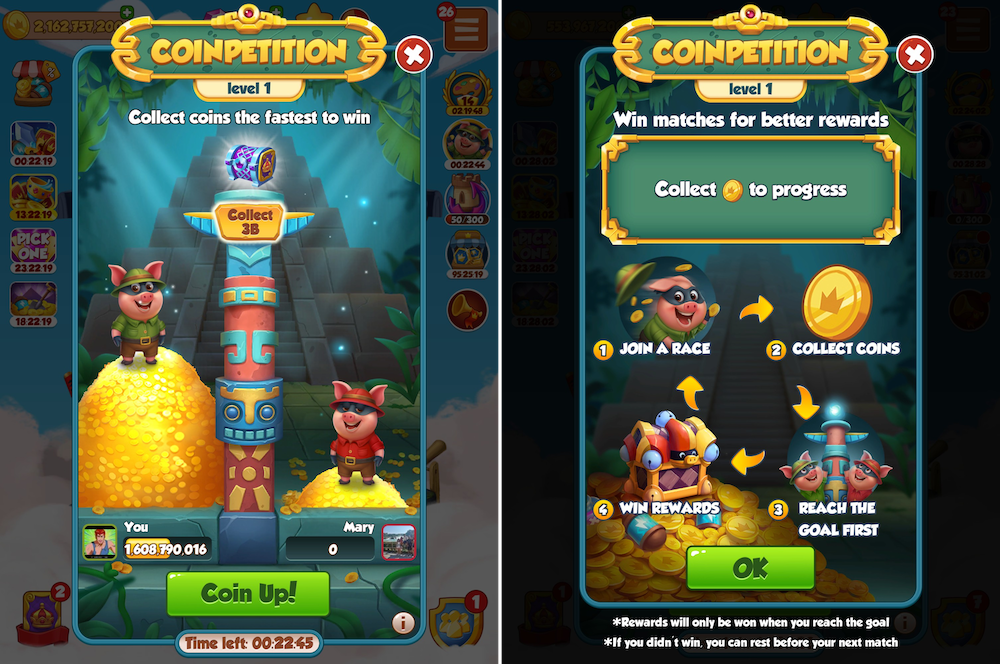
Coin Master’s other 1v1 competitive event, Arena of Warriors, is largely the same. Players are paired against each other and compete to see who can gather a target number of event points (earned by participating in raids and village attacks) the fastest. After defeating their opponent, players move onto the next stage, competing against a new opponent with a higher point requirement and better prizes – which include currencies, energy points, and special items like seasonal collectible cards.
One of the most enjoyable aspects of the Arena of Warriors is the UI, which turns the competition into a literal battle – not too dissimilar from a classic fighting game. Each player is represented by a warrior avatar, such as a pig wearing battle armor, which swipes at the enemy as the player moves toward the target threshold. Progression is indicated by each avatar’s health bar, which hits zero once the opposing player wins.
Another great aspect of Arena of Warriors is how it naturally integrates itself within the core gameplay of Coin Master, as it involves spinning the slot machine for a chance to raid or attack other villages. Plus, as three of the same symbols required for raiding or attacking are hard to get, players will usually need to purchase more energy points to be able to spin the slot machine a sufficient number of times to succeed.
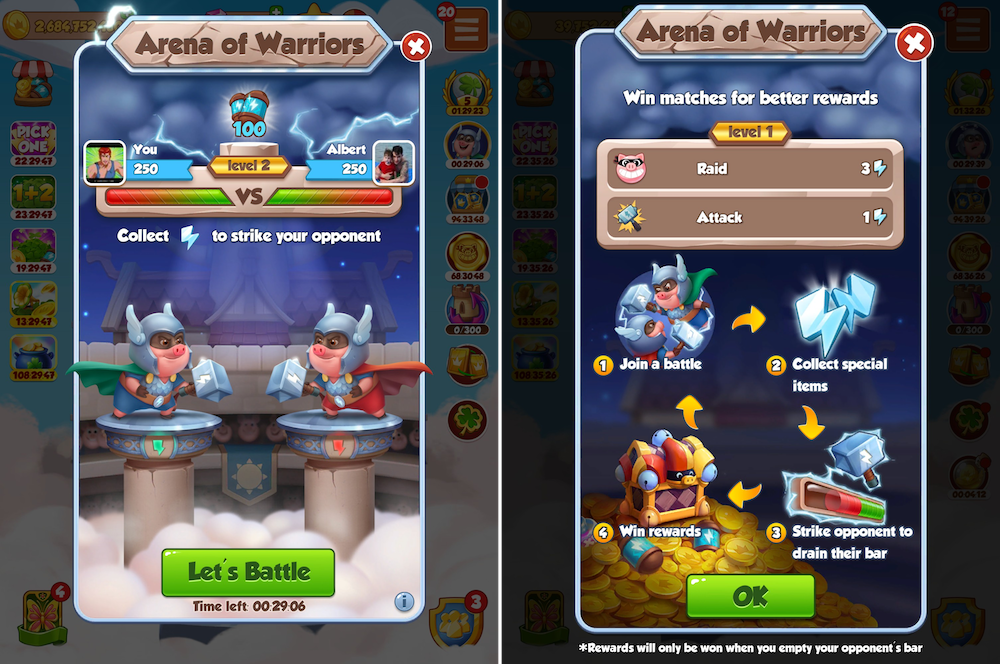
Jackpot World™ – Slots Casino’s Magic Combat event
Having a permanent Coin Master-like mode in a traditional slots game is already pretty unique, and combining that with a robust LiveOps strategy can really spice things up to the next level.
In recent updates, Jackpot World™ added a 1v1 competitive event called Magic Combat to its Dreamy Voyage side mode. Magic Combat works exactly like the Arena of Warriors event in Coin Masters. Players are put into random pairs and race to collect the required number of event points within a 30-minute time limit. The winner gets various rewards and advances to the next battle level, which comes with a new opponent and better prizes.
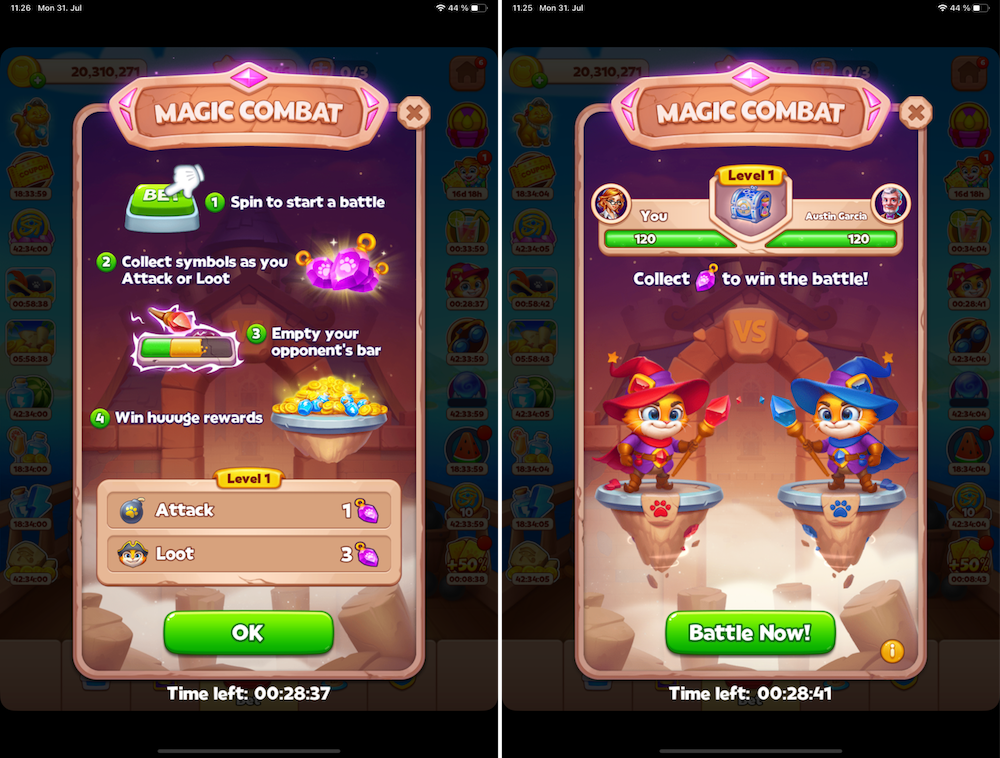
Township’s Explosive Duel event
Explosive Duel, a 1v1 Competitive event, has made its way into Township, a tycoon game with a robust LiveOps strategy. Interestingly, instead of supporting the core gameplay loop like in casual puzzle games, Explosive Duel is implemented as a side event supporting the match3 minigame events. How it works is that players compete against an opponent for a 30-minute period, and whoever gets the highest event score wins the battle. Players earn points by using exploding Dynamite power-ups in match3 levels in the currently running minigame event.
The minigame events have gradually become a big part of Township’s event framework, so players are incentivized to participate in the event and complete the relevant match3 levels. And, besides the Explosive Duel, Township has implemented additional competitive event types (race and solo tournament events) as minigame-supporting events, which further complements the engagement of players.
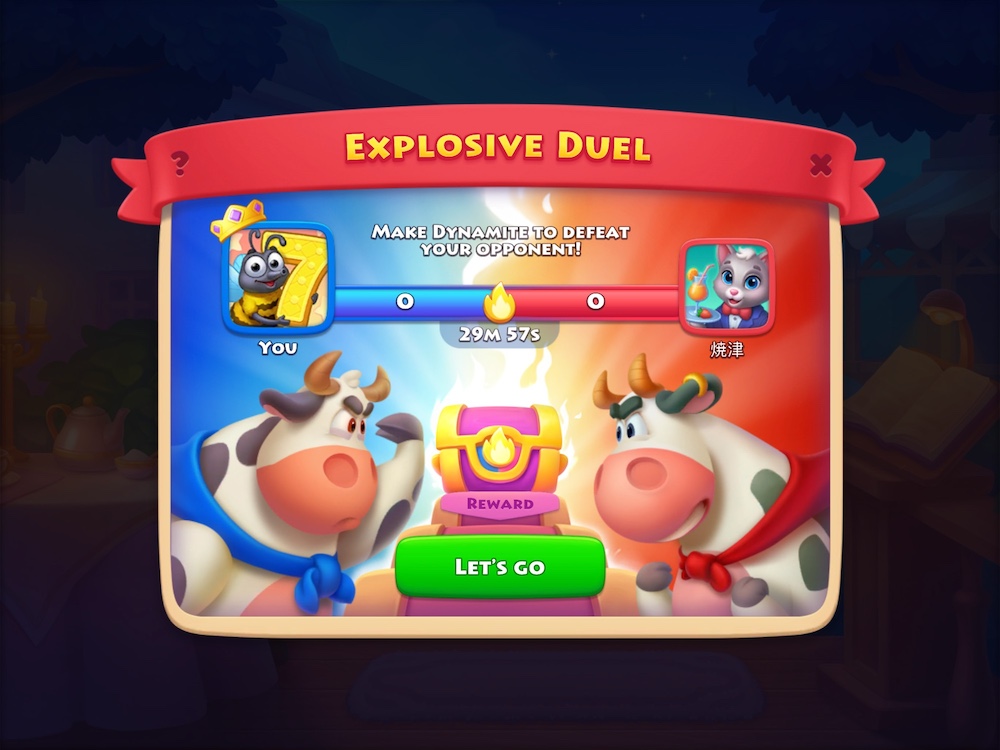
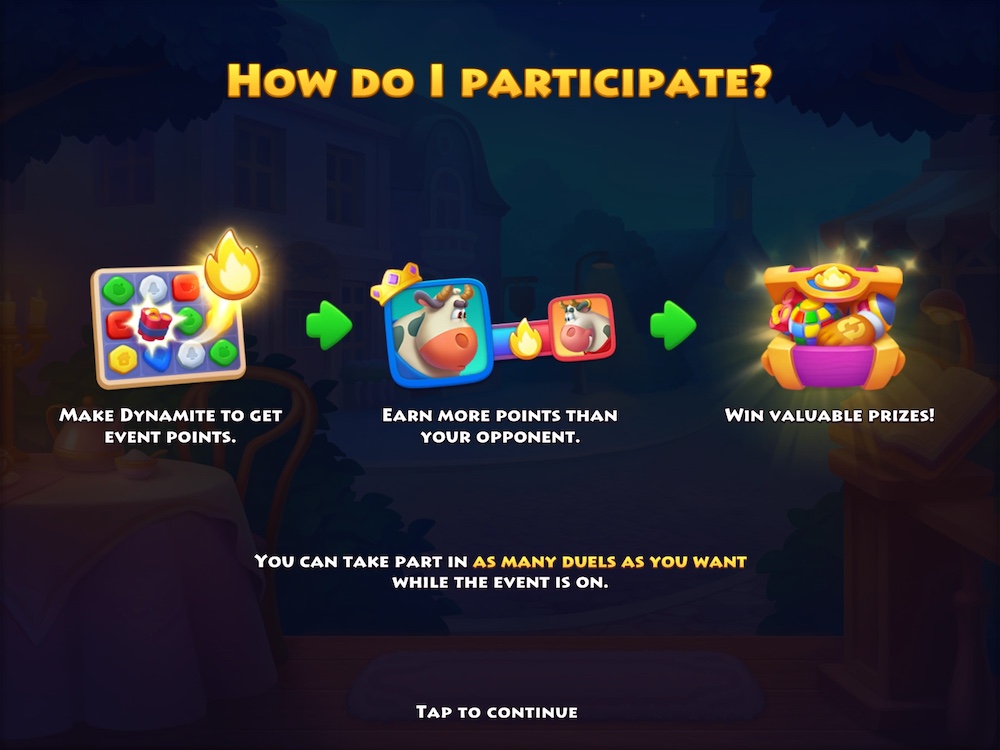
Key takeaways: why more developers should consider implementing 1v1 competitive events into their games
All these 1v1 competitive events effectively complement the core gameplay loop of each title, incorporating additional motivational drivers and incentivizing indirect monetization, all without creating too much work for the developers tinkering away behind the scenes. A select few titles have even experimented with this model further to drive direct monetization by implementing features such as win-streak mechanics to encourage booster purchases, as well as monetized retries and continues.
But the main point is that 1v1 competitive events are quite effective and that more developers should be considering how they can be integrated into their LiveOps strategies so they can reap the following benefits:
- Many developers might be worried about experimenting with player motivations as it might disrupt their performance. This isn’t really an issue with 1v1 competitive events, as they primarily use the same mechanics and content as the main game, allowing developers to see whether there is any positive impact on engagement with minimal risk.
- If implemented well, a 1v1 competitive event can inspire powerful ad creatives, further boosting the game’s UA by piquing the audience’s curiosity and interest.
- Adding a brand-new event type with distinct mechanics can provide exciting and refreshing content for new and old players to enjoy, boosting player engagement and retention.
- As discussed above, 1v1 competitive events can boost revenue performance, as players motivated by direct competitive elements are incentivized to make purchases to help them succeed.
If you enjoyed reading this blog and would like to learn more about competitive events, check out our post on how mobile game developers are driving player engagement with race events here.




